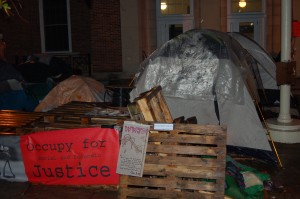“Taking space is a tactic; it’s not a message, so we take the space and hold the space for our own reasons,” said Evan Munn, an involved member of Occupy Chapel Hill. “[We] won’t always agree politically, but what we can agree on is that the space is good for us to share ideas, plan actions and network with people.”
This ideology is one of the main concepts behind what is now known as Occupy Chapel Hill, which began after an inaugural event was held Oct. 15. Tents were set up in front of the Franklin Street Post Office in downtown Chapel Hill, keeping the area occupied with a full time occupation.
The movement’s members occupy for several different causes, but they are primarily trying to make known their thoughts against what they believe to be an unfair distribution of wealth in America.
“They are looking for attention and getting the message out there that they’re not happy with the way income in the United States is distributed,” said social studies teacher Skip Thibault. “So what they are doing is just a form of civil disobedience.”
Many people feel that, despite attracting attention, the Occupy Chapel Hill movement is not a particularly noteworthy cause.
Jose Hernandez, a sophomore who lives near Chapel Hill, doesn’t take the movement seriously, nor pays it much attention as a passerby.
“They’re just there. You can see them and you’re just like, ‘Alright, whatever,’” said Hernandez.
Sophomore Justin Elkins sees Occupy Chapel Hill as a poorly planned concept as well. He believes that the opinions of many of the protestors are poorly supported and that their movement is poorly planned.
“I think it’s kind of stupid because they’re protesting in the wrong place,” said Elkins. “And there is not really anything to protest about; most of the people there don’t even know what’s going on.”
Yet, there are also those who strongly support the cause.
Jeff Forbes, a senior and frequent visitor of Occupy Chapel Hill, thinks that the protestors deserve admiration for the time, effort and discipline they put towards their demonstrations.
“The community involved with Occupy Chapel Hill should be respected for their willingness to give up their jobs and free time for the chance to bond together and let their opinions be heard in hope of change,” said Forbes.
As the movement remains active, members of Occupy Chapel Hill meet in the Capitol building at 6 p.m. every evening in a general assembly to discuss plans for the occupation.
The protesters discuss things collectively as a group, and normally about 30 members attend each meeting, sometimes breaking up into smaller, more manageable groups and then presenting their thoughts collectively after some brainstorming.
“Consensus doesn’t work over everything, but its not designed to. It’s only designed to work over issues that affect the whole group, so what I would like to see is more consensus groups come up all across the country,” said Munn, explaining his thoughts on the general assembly.
Although Occupy Chapel Hill tries to be a positive part of the community, many people see the organization as burdensome on the Chapel Hill area.
“It can deter people from going there because it’s a bunch of people protesting about what they don’t even know,” said Elkins.
Despite the different opinions concerning Occupy Chapel Hill, whether it’s worthwhile or worthless, nobody can argue with the fact that the act of protesting in America is nothing new.
“We are all about protest in this country; we are about freedom of speech and the first amendment,” said Thibault.

